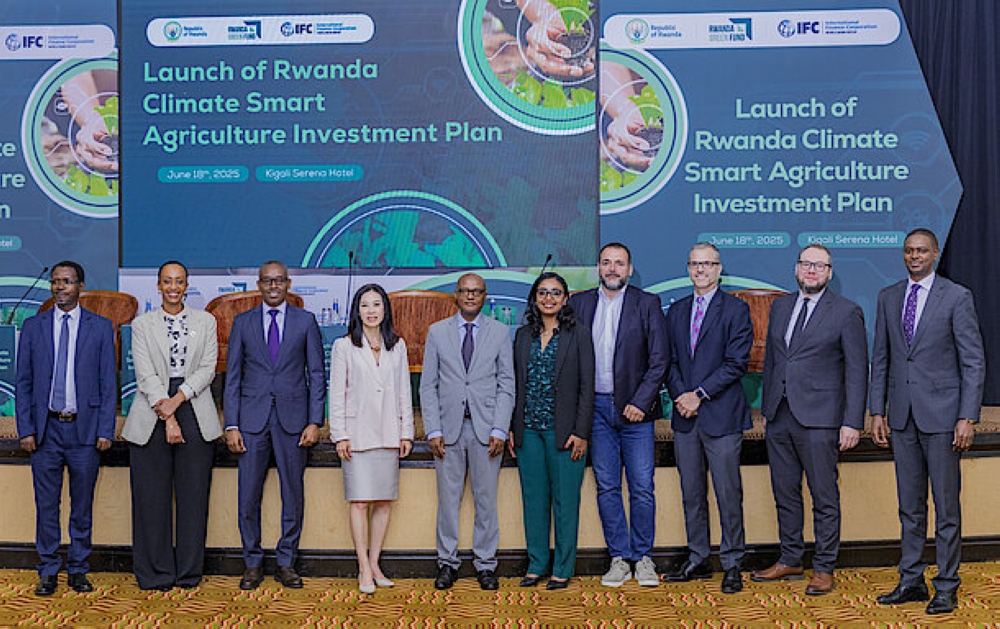KIGALI, June 19, 2025 –– The newly released Rwanda Climate Smart Agriculture [CSA] Investment Plan [IP], supported by the International Finance Corporation [IFC], identifies RWF 449.7 billion [ US$ 335.4 million equivalent] in potential private sector investment opportunities into projects that will improve and increase food production in the country, supporting food security and job creation.
The Ministry of Agriculture and Animal Resources [MINAGRI] and the Rwanda Green Fund, in collaboration with IFC, launched the report on Wednesday. In the short term, the Plan focuses on creating awareness, building an investment pipeline, supporting farmers and companies with technical assistance, and implementing policy solutions.
In the longer term, the Plan aims to scale and mainstream climate smart agriculture investments by securing additional funding, expanding investment opportunities, and implementing policy reforms. According to the plan, about two-thirds of the total investment opportunity will be in water supply and irrigation, with additional opportunities in climate-resilient planting and replanting, post-harvest loss reduction, climate-resilient livestock development, and enhanced soil health.
“This CSA Investment Plan is in line with Rwanda’s Strategic Plan for the Transformation of Agriculture [PSTA5] which aims to accelerate agricultural transformation through increased climate resilience, productivity, market access, and private sector investment, with the overarching goal of ensuring food security, economic growth, and improved livelihoods,” stated Dr. Mark Cyubahiro Bagabe, Minister of Agriculture and Animal Resources. “The Rwanda CSA Investment Plan serves as a roadmap for mobilising investment to support climate-resilient and sustainable agricultural practices and put in place supportive regulatory frameworks.”
“This strategic initiative enables us to mobilise climate finance at scale, reinforcing Rwanda’s commitment to sustainable agricultural development and private sector engagement,” noted Teddy Mugabo, CEO of Rwanda Green Fund.
Rwanda’s agriculture sector is crucial to the country’s food security and economic growth. However, the sector is vulnerable to climate change, including unpredictable rainfall, increased temperatures, prolonged droughts, and soil erosion, which are threatening crop yields and livestock productivity, jeopardizing rural livelihoods.
The plan anticipates supporting about 83,250 hectares of land to become more resilient and productive through efficient water use, higher-yielding crops, and enhanced soil health. It suggests linking an estimated 170,200 farmers and 375 companies to climate smart financing through bankable investments, fostering long-term business relationships.
“The Investment Plan provides a national-level strategic framework to prioritize private sector-oriented climate smart agriculture investment opportunities, identify financing mechanisms, and propose key actions for the government to achieve meaningful impact,” said Jiyeon Janice Ryu, IFC Resident Representative for Rwanda.
Developing climate-resilient, productive, and modernized agri-food systems is a central focus of Rwanda’s National Strategy for Transformation [NST2], which seeks to increase private investment in the economy from 15.9 percent of GDP [US$ 2.2 billion] to 21.5 percent [US$ 4.6 billion].
About Rwanda Green Fund [RGF]
Established in 2012, the RGF is the country’s financing vehicle for mobilising and catalysing climate finance to support Rwanda’s sustainable development agenda. The Fund has raised over US$ 364 million and invested in 114 public and private sector initiatives that drive transformative climate action. RGF is transitioning from a project-by-project approach to a programmatic model, bundling related investments into cohesive programmes that attract multi-year, large-scale financing. These programmes are guided by Investment Plans that outline strategic interventions across sectors, all aligned with Rwanda’s long-term development goals.
Buy your copy of thecooperator magazine from one of our country-wide vending points or an e-copy on emag.thecooperator.news
